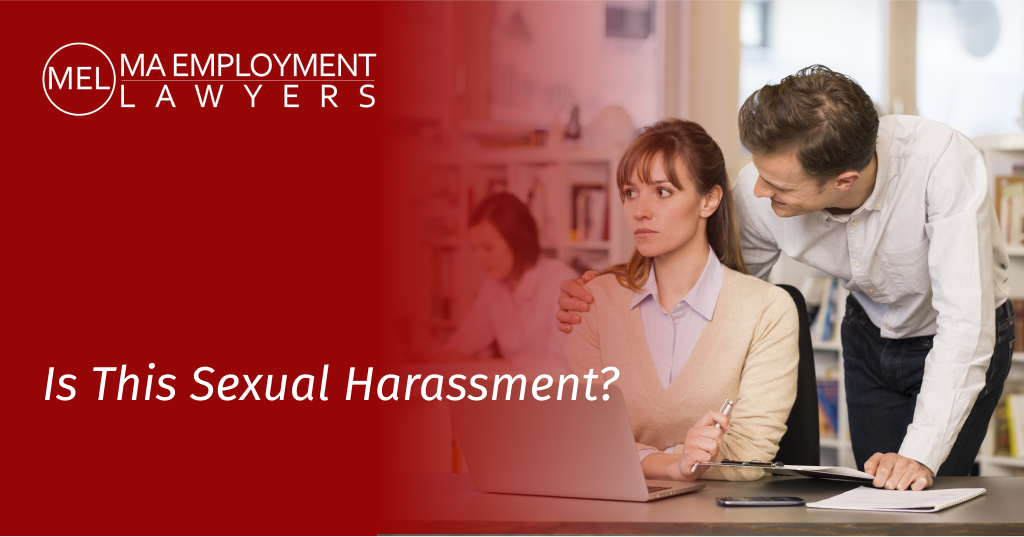Is This Sexual Harassment?

Sexual harassment takes many forms. To learn more about sexual harassment and how to combat it read our post on: “How to Address Workplace Sexual Harassment”. To better understand what types of situations you might experience that constitute sexual harassment, read through the examples below:
Situation 1: Employee A is a female cashier at a supermarket. Employee A regularly hears her male supervisor sexually objectifying customers to another male cashier. Employee A never overhears the manager sexually objectifying her, but she regularly hears him describe sexual acts he would like to perform on female customers in gruesome detail.
Is Employee A being sexually harassed? Answer: yes. Employee A is experiencing a hostile work environment, which is a form of sexual harassment. Even though employee A is not the subject or the target of the sexually explicit comments, she is within the class of individuals (i.e., women) that her manager is sexually objectifying. Further, because the harasser is a manager and not merely an employee, the employer is responsible for their behavior, even without Employee A notifying anyone else at the company. Therefore, she has a claim of sexual harassment against her employer.
Situation 2: Employee A (female) is having a conversation with Employee B (male). Both employees A and B voluntarily and consensually discuss their romantic life with their respective partners. Neither Employee A nor Employee B are supervisors or managers. Two days later, Employee B broaches the subject of Employee A’s love life while at work. Employee A says that she does not want to discuss this topic with Employee B any further and the discussion ends without the topic being raised again.
Does Employee A have a viable claim for sexual harassment in the workplace? Answer: no. For Employee A to bring a successful claim of sexual harassment, she will need to prove that the comments made by Employee B were unwelcome. Because she previously voluntarily discussed this topic, it would be difficult for Employee A to demonstrate that this topic of conversation was unwelcome. Further, even if it were unwelcome, a single instance of this behavior may not be sufficient to show that the condition of employee A’s work environment has materially changed. Finally, without showing that the employer knew Employee B engaged in sexually inappropriate behavior before he commented, Employee A will have great difficulty holding the employer liable for the behavior of Employee B.
Situation 3: Employee A is starting her job at a car dealership. On the first day of her employment, she meets a coworker, not a manager, named Employee B. Employee B has worked for the car dealership for several years, and is a top salesman, but has previously been reported for sexually harassing women in the workplace. Employee B immediately makes some sexual jokes directed at Employee A. After making the joke, the coworker smacks Employee A on the behind and leaves. This was Employee A’s first interaction with Employee B.
Can the employer be held liable for Employee B’s behavior? Answer: yes. Typically, if a non-manager coworker sexually harasses another employee, the employer will not be held liable until after the employer has been allowed to prevent it from happening again, and yet it happens again. However, this notice requirement is not necessary if, before Employee A’s instance of sexual harassment occurred, the employer knew about other past instances of sexual harassment carried out by Employee B, even if they were not directed at Employee A. Phrased differently if the employer knew that the coworker had a history of engaging in sexually harassing behavior and failed to address that behavior, the employer may be liable for the co-worker’s behavior. While only a single instance of sexual harassment, the interaction is potentially severe enough to rise to the level of a hostile work environment.
If you or someone you know has been a victim of sexual harassment in the workplace, our attorneys are available for a free consultation and are available by phone at (508-753-3333) or email at the following email address: contactforms@cohenkinne.com. We have recovered millions of dollars for our clients who have experienced sexual harassment in the workplace.




